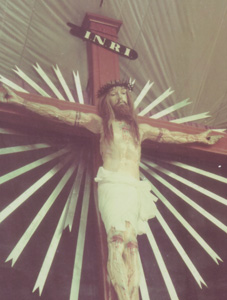In the 19th century, some fisherfolk in Duwa sailed to South India in their catamarans to buy dry fish, nets and other fishing apparatus. Among them were three brothers Juvam, Domingo and Peduru who were the sons of Mihindu Kulasuriya Adrian Fernando. They came to know Jokeenu Maistri, the great sculptor in Cochin. In consultation with the elders of Duwa, they asked Jokeenu Maistri to make a statue of Christ for the Duwa Passion Play.
In the season of Lent in 1838, a group from Duwa went to Cochin to bring back the statue of Christ. As the paint on the statue had not dried, Jokeenu Maistri had advised them not to remove the statue immediately. However, the south west monsoon was about to set in and as sailing back would have been difficult, they brought the statue to Duwa against the advice of Jokeenu Maistri.
The people of Duwa welcomed the statue of Christ with pomp and ceremony. However, when they opened the casket to their dismay they found the paint smudged and the statue mildewed. They were disappointed that they could not perform the Duwa Passion Play the following year (1838) with the new statue.
 |
| The statue in Duwa |
The elders wanted to get Jokeenu Maistri to Duwa to repaint the statue. As he was too old Jokeenu Maistri sent his most senior pupil for the purpose. The pupil re-painted the statue with a mixture of gold, and as a result the statue has a special gold tint not found in other statues of Christ. The magnificent statue of Christ in Duwa attracted more and more people to the Duwa Passion Play.
The Duwa Passion Play was organized throughout by the lay custodians of the statue of Christ. However, it was never a secular drama but a spiritual exercise performed in collaboration with the parish priest of the church of Our Lady of Good Voyages in Duwa.
Later when some people of Duwa settled down in Negombo and erected St. Peter's Church in the city, once in three years the famous statue of Duwa was taken for the Passion show at St. Peter's Negombo. In the meantime the traditional organisors of the Duwa Passion Plays formed themselves into an organization called the 'Duwa Pasku Sanvidanaya'
In 1939, when Fr. Marcelline Jayakody became the parish priest of Duwa, the Duwa Passion Play was performed with age-old statues based on "Dukprathi Prasangaya" written by Fr. Jacome Gonsalvez. Fr. Marcelline Jayakody revised and recast the Passion Play based on Dorothy Saeyer's famous drama' Born to be a King' while maintaining the traditional outlook, Fr. Jayakody used people for all the roles except for Christ and Mary. He also composed all the hymns for the play in addition to the traditional Pasan chants. Since then the fame of the colourful Duwa Passion Play spread far and wide.
The magnificent Passion play was performed with over 250 actors all drawn from the island hamlet of Duwa.
In the 1970's, human actors were introduced even for Christ and in 1989, the 150th anniversary of the Duwa Passion Play with the outstanding statue of Christ and the 50th anniversary of the presentation of Fr. Marcelline Jayakody were together celebrated. In the 1990's things took a different turn. In 1991 as usual the Duwa statue of Christ was taken to St. Peter's Church, Negombo but arrangements were made to hand back the statue to a new group the Duwa Daham Seva Organisation formed under the parish priest.
The Duwa Pasku Sanvidanaya, the traditional organisors of the Duwa Passion Play filed a case in the District Court of Negombo and obtained an injunction prohibiting the new arrangement.
As a result of the court case the Duwa Passion Play could not be enacted from 1992 to 1995. In 1995, the case was settled and the parties agreed to hand over the statue of Duwa unconditionally to the Archbishop of Colombo. In February 21, 1996, the Most Rev. Nicholas Marcus Fernando, the then Archbishop of Colombo, made an official declaration that the Duwa statue would be placed in a special premises in Negombo and in 1997 the Duwa Passion Play would be enacted with the joint collaboration of all the relevant organizations of St. Mary's Church, Duwa and St. Peter's Negombo.
If proper steps are not taken by the Church authorities even at this late stage to revive the colourful Duwa Passion Play – which has brought fame not only to the village of Duwa but to the whole of Sri Lanka, it would, sadly, be forgotten.
(The writer is a former High Court Judge and Vice-President of the Newman Society Alumni Association) |

